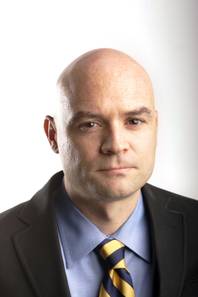
J. Patrick Coolican
Sun coverage
For thousands of Southern Nevadans who have dealt with a family member in crisis, watching the Steven Brooks story unfold must feel surreal and all too familiar.
Brooks, a Democratic assemblyman, was hospitalized Friday after his family called Metro police because of his increasingly erratic behavior, which indicates he is unwell and needs help.
The safety of Brooks and his family and other legislators is paramount. The situation came to light when he was arrested Jan. 19 with a loaded gun. Police allege he had been making threatening remarks about Assembly Speaker Marilyn Kirkpatrick after he had been passed over for an important committee assignment.
Once there’s some stability, I hope that his situation might spur a conversation about mental health services in Nevada. Specifically, the lack thereof.
Unfortunately, this is the second time I’ve had to write this column, so forgive my plagiarism. Last year, I wrote about this issue because of the late-2011 death of Stanley Gibson, a mentally ill veteran who was shot and killed by Metro police.
“In general, there’s a shortage; a shortage of providers and not a great system to get services to people who need it,” Barbara Buckley, former speaker of the Nevada Assembly and the head of Legal Aid of Southern Nevada, said Saturday.
Buckley said there’s wide acknowledgement in state government of the need for more mental health services, but the needs are just as great in K-12 and higher education, for instance.
My fear, however, is that mental health gets short shrift because, unlike suburban parents, the mentally ill and their families are not a political constituency with much of a megaphone.
According to the Treatment Advocacy Center, Nevada has the fewest psychiatric beds — 5.1 per 100,000 residents — of any state in the union. Our mental health spending is 43rd per capita, according to Kaiser Health Facts. During the ongoing budget crisis of the past five years, $80 million was cut, according to former legislator Sheila Leslie, who was chairwoman of health and human services committees and watched those budgets deteriorate.
As I noted last year, in Clark County, we have 733 beds, but 127 are set aside for the elderly and 58 for children. We have 298 beds at Rawson-Neal Psychiatric Hospital, but the Legislature only budgeted staffing to support 190 this biennium.
As I write this, Brooks is still hospitalized.
Once he’s released, however, the wait for outpatient services can be 30 to 40 days, according to the state’s Division of Mental Health and Developmental Services.
“We only serve the sickest of the sick,” Leslie said.
In the end, we wind up using our jails and prisons as psychiatric facilities. Sheriff Doug Gillespie has said between 25 and 30 percent of inmates are in need of psychiatric medication at any one time. Once released, they often have no access to the medication they need.
Metro prides itself on its crisis intervention team and progressive policies for dealing with the mentally ill, modeled after a successful program in Memphis, Tenn. But in a better system, police would be able to focus more on policing and less on this population.
Leslie notes the strong stigma attached to mental illness, though of course that’s true everywhere and not just here.
She said people may be reluctant to seek care for themselves or family members, and then once they do, navigating the system is difficult, if not impossible.
I wrote a different column Friday, one that asked why Nevada seems to attract its share of eccentrics and incompetents and occasional criminals into its elite echelons of politics, business and even nonprofit groups. I avoided openly mocking Brooks but didn’t spare other notables.
As news broke late Friday about Brooks’ hospitalization, even ambient, light-hearted mockery seemed tone-deaf.
I was especially struck Friday by a wise piece written by Kristy Totten on the website of CityLife titled, “Why we should not ridicule Assemblyman Steven Brooks.”
“Through snarky tweets, nasty reader comments and newsroom jokes, we’ve dismissed Brooks’ behavior as comical, deserving of ridicule because nothing came of his delusions, no one was hurt. But what if something had happened? Would it still be funny then? The answer is no.”
I’ll come clean on some snarky tweeting about the situation as late as Friday morning.
In defense of colleagues, this is an important and fascinating story, so I fully understand the need to aggressively report it. And, so far as I know, none of us is qualified to understand what is going through Brooks’ mind or has much experience confronting a situation like this. Throw all these factors together, and we wind up with Brooks shirtless on the front page of the Las Vegas Review-Journal, which, in retrospect, seems imprudent and exploitative.
Totten has it right when she concludes:
“We have the opportunity here to help someone, and to prevent people from getting hurt. In many ways, this presents a test case for Nevada. If we can’t figure out how to help a guy who is imploding so spectacularly in full public view, how can we create a system that will help quieter, less visible cases? It’s human nature to laugh off tragedy that doesn’t happen, just as it’s human nature to wonder, when it does happen, why we didn’t see it coming. Regardless of how we ultimately address this, one thing is for certain. We should not laugh, and we should not simply move on.”


Join the Discussion:
Check this out for a full explanation of our conversion to the LiveFyre commenting system and instructions on how to sign up for an account.
Full comments policy